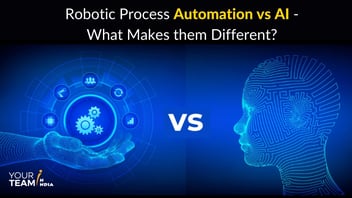Think of a world where you do not lose customers or money because of a misplaced document, communication gap, or a delay in acting - all these errors can be easily prevented.
Robotic Process Automation makes it a reality. And, with automated processes in place, your company enjoys benefits like cost reduction, minimized errors, maximized ROI, and freeing your employees from mundane tasks - this list is endless.
The unvarnished truth is that process automation makes life easier for everyone, from customers to suppliers to employees to executives.
So, how about automating your business? Where should you start, what should you consider, how to select the perfect candidates for the automation process and what pitfalls should you avoid ensuring the success of your implementation?
You’ll find answers in this article. Keep on reading! But, first, you need to decide on what type of automation will be an ideal fit for your business process.
What Type of Automation is Available for Your Business Processes?
Considering the complexity of the process that is selected for automation, there are a handful of options:
RPA (Robotic Process Automation)
RPA is a one-stop solution to building more complex automation. RPA helps businesses to connect various tools like databases, CRM, SAPs, etc. and automates data processing and documents.
Thanks to automation platforms like UiPath, the development and integration usually get completed within a couple of weeks and are relatively low-cost. Not to forget, these platforms are also developed with the low-code principle, giving developers more time to focus on their coding skills than on the tool they are using.
Besides, there is also a consideration of user interface - RPA has the potential to automate any application by interacting with it using UI, the same as a human.
Tool-Dedicated Scripting
Tool-dedicated scripting is often used for automating simple tasks inside a specified application. Also, deployment takes a few days and is confined to a single application.
For example, Excel, Outlook rules, SAP scripting, and macros are a handful of them.
Dedicated Automation System
100% customized applications allow automation of numerous processes and tasks of the highest complexity, all in one place, starting from scratch. Besides, there is no limit to what can be accomplished here, but the same holds true for the potential cost.
The complete deployment time can be evaluated in a time frame of months or even years.
Automation Scripts
The automation scripts are written using a specific programming language, i.e. Python or PowerShell. They are used to automate a bit more complicated tasks. Furthermore, this automation still has some limited application interactions.
Though, developing and deploying these usually can take a few weeks.
Also, it empowers businesses to streamline workflows by connecting applications between different departments. By integrating automation, you not only save on man-hours but also boost the overall processes to curate a niche.
Besides, you can use simple tools and software to automate repetitive tasks with specific business logic and data, streamlining the processes and enhancing efficiency manifold.
But, the most frequently asked question remains: How Does Automation Help Businesses?
Here’s the answer!
How Does Automation Help Businesses?
Despite its nature, every business has the potential to automate its processes to accelerate the workflows and maximize productivity. For example,
- The HR department can boost the employee onboarding process.
- Customer service businesses can retrieve data and conversation logs in seconds to escalate concerns.
- Sales and marketing teams can also use CRM with marketing automation to send emails, track sales proposals, and report hassle-free.
- Also, the finance department can easily manage accounts and payables more precisely.
Thus, it’s right to say that automation has something for each function. Besides, hiring an RPA developer makes more sense for businesses to implement automation across various functions to connect and streamline the business processes, improve compliance, drive better customer engagement and maximize business profitability.
Finally, Everything Funnels To What Processes To Automate?
But, wait!
How will you pick the right processes for automation? There are innumerable processes in an organization that can be automated. Although, the most crucial question at this point is - is it worth it?
How to Pick The Right Processes for Automation?
For instance, if a manual execution of a process consumes a few hours a month, the development will take half a year.
- So, can this process be automated? Yes.
- But, shall this process be automated? No.
This part of the article will shed light on the factors you should consider before selecting the right process for automation:
Ease of Integration
“Ease of Integration” is an aspect that scales a process on the metric of stability, complexity, scalability and more for a clearer picture of what business activities can be easily automated. Besides, it will determine if a business process is well suited for automation.
-
- Stability - This focuses on how long the process will be executed in its present shape. How significant can the advancements be? For example, the taxation process changes every year. So, considering this, it’s not advisable to automate existing business logic as it will have to be redesigned again and again.
- Complexity - This consist of the number of different paths of execution and logical rules to address challenges in the integration process of RPA.
- Standardization - This is the process executed according to defined rules or rooted in human judgment.
- Data Accessibility - This focuses on whether required data is structured (pure text vs data tables) or digital (paper invoice vs invoice scan vs digital invoice).
- Scalability - Scalability defines the capacity to manage many RPA robots to execute several different tasks.
Business Value
The Business Value of RPA is productivity, customer satisfaction and efficiency. To achieve this, it’s crucial to focus on everything from execution time costs to error costs. Let’s have a look!
- Execution Time Cost - This outlines the cost a company faces because of any delay in executing the process. Furthermore, delay in a specific process gushes the time of the employees and other processes related to it.
- Process Execution Cost - This aspect includes the cost and time required for the manual execution of the process.
- Process Error Costs - This includes how many errors happen during the manual processing, how crucial it is to confine the mistakes, and the company's loss due to them.
- Other Inescapable Elements - SLAs, limited workforce availability and execution time, dynamic process growth, and other business KPIs.
The Add-Ons You Should Not Miss
- The Economy Of Scales - With several processes using the same application or logic, some specific parts of automated processes can be reused, making other automation easier to create.
- Ice Breakers -” When you hire an RPA developer, ensure the initial processes automated in the organization shouldn’t be complicated and optimally inspired by employees.
Process simplicity will help you avoid deadline violations, arguments, and other concerns, therefore making change management easier”.
- Optimizers - Creating automation is an excellent opportunity to standardize the current process, develop process documentation, and optimize it.
- Enablers - Automating one process probably generates data that another process needs, i.e, uploading scanned invoices data to the database.
Now, without any ado, let’s uncover the business processes that are ideal for automation.
Top Business Processes to Automate and Increase Efficiency
Are you still sitting on the fence about evaluating what processes to automate?
The answer to this question is tricky regarding your unique business needs and industry-oriented needs. Nevertheless, here are actionable process ideas which can be automated using RPA.
Remember, identifying business processes to automate is easy. Start with the most common and repetitive workflows that consume more time. Furthermore, even complicated workflows that require connected workflows or integration between different apps can also be automated.
Especially for businesses planning to hire RPA developers to automate business processes, here’s the list of processes to consider.
1. Employee Onboarding/Offboarding Process
Employee onboarding/offboarding is a crucial function that businesses can easily automate.
Since employee onboarding and offboarding are repetitive processes in companies and big enterprises, these can be significantly optimized by integrating cloud-based HR software. This software doesn't only streamline these processes but also provides a central location for all employee information that makes access and management notably easier. In addition, businesses can save time in resolving other critical HR processes by automating the employee onboarding and offboarding process.
In addition, with quicker onboarding and offboarding, businesses can also save on operational costs and simultaneously manage employee access and provisioning with ease.
2. Inventory Fulfillment/Order to Cash
This is among the most complicated processes as it needs managing customer orders, processing invoices, order shipments, receipt of payment, and updating compliance documents.
However, no concrete reason will define that it’s complicated to get the complete process automated. From generating a sales order in CRM to updating the final payments and inventory management in ERP, you can easily automate everything.
Considering the cash automation perspective, you can easily track the complete process without much flipping between excel sheets, emails, and documents. This ensures timely order fulfillment, improved customer experience, and optimal cash flow.
3. Customer Service Management
Customer service management is another domain that can be easily automated to expedite the customer resolution cycle. From creating incidents to recording conversations and escalating issues, businesses can track the complete customer support process in real time, leading to efficient customer service management and customer satisfaction.
4. Financial Reconciliation
Tracking finances and expenses are among the vital areas for business undefeatable success.
After all, a small mistake in calculating and interpreting financial reports can lead to incorrect insights leading to wrong decisions. So, automating financial reporting and reconciliation will help outline correct insights and help track budget and transactions, managing expenses once it reaches a predetermined level.
5. Supply Chain Management
Undoubtedly, automating order and supply chain processes can help businesses get a better and clear view of the movement of goods and expedite order fulfilment. This eventually results in better planning, execution, and management of all the underlying processes to uphold the customer value chain.
6. Insurance Claim Handling
Often, insurance claims are registered through web apps by clients. And, web applications are not integrated with the claim handling system, so the claims must be copied to the targeted system.
This is done because of the voluminous connection with high error vulnerability that generates hefty process execution costs. Although business rules are clearly defined, there are multiple execution ways like claim types and defined exceptions, making it a high value and a high development process.
Finally, Rome Was Not Built In A Day!
So, before you step on the mission to integrate RPA in business, have a quick rundown of which processes can be automated to offer the most benefits. Then, brainstorm with the right RPA development company like YTII to evaluate RPA's impact on policies, procedures, and people.
Notably, check several verticals and functions that would do good with automation.
Not to forget, do a little homework in selecting the best RPA developers that would offer a holistic solution to your business needs. You can easily mark the subtle difference by listing the strengths and weaknesses of each provider and then making a strategic decision. Only then should you embark on the implementation of RPA in your business.
Get in touch with industry experts to learn more about RPA integration in business processes that will help you stay ahead in your industry.
FAQ’s
What processes can be automated through RPA?
Below are a handful of actionable ideas where integrating RPA in 2022 and ahead proves beneficial:
- Customer Service. Modern customers are accustomed to quick responses and effective solutions.
- Invoice Processing
- Sales Orders and cash process
- Payroll
- Price Comparison
- Employee onboarding/offboarding
- Storing Customer Information
- Processing HR Information
- Processing Fast Refunds
- Insurance claims
- Supply chain management
Which processes are best for RPA?
The right candidate for business processes to automate are as follows:
- The voluminous processes with manual handling
- High Volume Transactions - The processes or tasks that are repeated again and again at high volume.
- Rule Based Processes - Check for the processes if they can be described using a flowchart.
-
How does RPA increase efficiency?
There’s no doubt that RPA increases business processes efficiency manifold. Let’s have a look!
- Automate repetitive tasks
- Develop and deploy bots
- Rule-based process automation
- Create customized bots
- Extract data using bots
- Hassle-free data management
- Build and automate untold workflows
- Keep track of workflows effortlessly
What are the benefits of RPA?
There are endless benefits of RPA in business processes. But, here’s the significant one’s:
- Achieve accuracy goals with reliable consistency
- Boost productivity across the board
- Build a better customer service engagement
- Generate data for crucial analytics
- Improve efficiency to produce savings
- Capture opportunities for scale
- Enhance business data security







